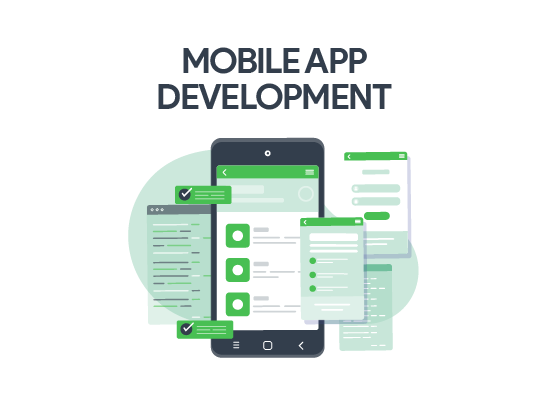Course Title: MOBILE APPLICATION DEVELOPMENT WITH FLUTTER
Module 1: Introduction to Flutter
Unit 1: Fundamentals of Flutter
- Introduction to Flutter
- Flutter Architecture and Framework
- Key Features of Flutter
- Installing Flutter and Setting Up the Development Environment
Unit 2: Dart Programming Language
- Introduction to Dart
- Basic Syntax and Data Types
- Control Flow and Functions
- Object-Oriented Programming in Dart
Unit 3: Flutter Widgets
- Understanding Widgets in Flutter
- Stateless vs Stateful Widgets
- Commonly Used Widgets
- Building and Composing Widgets
Unit 4: Flutter Development Tools
- Overview of Flutter Development Tools
- Using Flutter DevTools
- Debugging Flutter Applications
- Performance Profiling and Optimization
Module 2: Building User Interfaces
Unit 1: Layouts and Navigation
- Creating Layouts with Flutter
- Using Rows, Columns, and Containers
- Implementing Navigation in Flutter
- Navigation with Routes and Navigator
Unit 2: State Management
- Introduction to State Management
- Managing State with setState
- Using Provider for State Management
- Advanced State Management with Riverpod and Bloc
Unit 3: Animations in Flutter
- Basics of Animation in Flutter
- Built-in Animation Widgets
- Custom Animations with AnimationController
- Implementing Complex Animations
Unit 4: Custom Widgets
- Creating Custom Widgets
- Extending Existing Widgets
- Custom Painting and Drawing
- Best Practices for Custom Widgets
Module 3: Data Handling and Backend Integration
Unit 1: Handling Data in Flutter
- Working with JSON Data
- Parsing and Serializing JSON
- Using Local Storage (SharedPreferences, SQLite)
- Handling Data with Firebase Firestore
Unit 2: Networking and APIs
- Making HTTP Requests with Dio and Http
- Consuming RESTful APIs
- Error Handling in Network Requests
- Best Practices for Networking in Flutter
Unit 3: Firebase Integration
- Setting Up Firebase in Flutter
- Authentication with Firebase
- Real-Time Database and Firestore
- Firebase Cloud Messaging for Push Notifications
Unit 4: Working with GraphQL
- Introduction to GraphQL
- Setting Up GraphQL in Flutter
- Making GraphQL Queries and Mutations
- Handling GraphQL Subscriptions
Module 4: Advanced Flutter Features
Unit 1: Advanced UI Components
- Using Slivers and CustomScrollView
- Implementing Tabs and Drawers
- Creating Custom Transitions
- Advanced Form Handling with FormBuilder
Unit 2: Platform Integration
- Accessing Native Features with Platform Channels
- Integrating with Native Code (Android and iOS)
- Using Device Sensors and Camera
- Handling Permissions in Flutter
Unit 3: Testing Flutter Applications
- Writing Unit Tests in Flutter
- Widget Testing and Integration Testing
- Using Mockito for Mocking
- Continuous Integration and Deployment
Unit 4: Performance Optimization
- Identifying Performance Bottlenecks
- Optimizing Rendering and Layout
- Memory Management Best Practices
- Using Flutter DevTools for Performance Tuning
Module 5: Flutter for Web and Desktop
Unit 1: Flutter Web Development
- Introduction to Flutter Web
- Setting Up Flutter for Web Development
- Building Responsive Web Applications
- Deploying Flutter Web Apps
Unit 2: Flutter Desktop Development
- Overview of Flutter Desktop
- Setting Up Flutter for Desktop
- Building Cross-Platform Desktop Applications
- Packaging and Distributing Desktop Apps
Module 6: Publishing and Maintaining Flutter Apps
Unit 1: Preparing for App Store Deployment
- Setting Up App Store Accounts (Google Play, Apple App Store)
- App Store Guidelines and Requirements
- Creating App Icons and Launch Screens
- Preparing App for Release
Unit 2: Continuous Integration and Deployment (CI/CD)
- Introduction to CI/CD for Flutter
- Setting Up CI/CD Pipelines with GitHub Actions and Bitrise
- Automated Testing and Deployment
- Monitoring and Maintaining Released Apps
Unit 3: App Maintenance and Updates
- Importance of App Maintenance
- Handling User Feedback and Bug Reports
- Planning and Implementing App Updates
- Best Practices for App Maintenance
Module 7: Advanced Topics in Flutter
Unit 1: Flutter Plugins and Packages
- Using Third-Party Plugins and Packages
- Creating Custom Flutter Plugins
- Publishing Packages to Pub.dev
- Managing Dependencies in Flutter
Unit 2: Internationalization and Localization
- Introduction to Internationalization (i18n)
- Localizing Flutter Applications
- Handling Multiple Languages
- Best Practices for Internationalization
Unit 3: Security in Flutter Applications
- Securing Flutter Apps
- Implementing Authentication and Authorization
- Secure Storage and Data Encryption
- Best Practices for App Security
Unit 4: Flutter for IoT
- Overview of Flutter in IoT
- Connecting Flutter Apps to IoT Devices
- Using Bluetooth and Wi-Fi for IoT Communication
- Building IoT Dashboards with Flutter
Mobile Application Development with Flutter
Outcomes: What You Become After Studying Mobile Application Development with Flutter
-
Flutter Developer:
- You’ll be proficient in using Flutter to build cross-platform mobile applications for iOS and Android from a single codebase.
-
UI/UX Designer:
- You’ll be skilled in designing and implementing smooth and visually appealing user interfaces using Flutter’s rich set of widgets and design principles.
-
Mobile App Architect:
- You’ll understand how to structure and architect mobile applications effectively, optimizing for performance and scalability using Flutter.
-
Dart Programmer:
- You’ll be capable of writing efficient code in Dart, the programming language used by Flutter, and leveraging its features for mobile app development.
-
Cross-Platform Specialist:
- You’ll have expertise in creating applications that run seamlessly on multiple platforms (iOS, Android) using Flutter, reducing development time and effort.
-
State Management Expert:
- You’ll be skilled in managing the state of your application effectively using Flutter’s various state management solutions.
-
Integration Specialist:
- You’ll understand how to integrate third-party services, APIs, and packages into your Flutter applications to enhance functionality.
-
Performance Optimizer:
- You’ll be capable of optimizing the performance of your Flutter applications, ensuring smooth and responsive user experiences.
-
Mobile App Tester:
- You’ll know how to implement testing strategies, including unit testing and widget testing, to ensure the reliability of your Flutter applications.
-
App Deployment Specialist:
- You’ll be proficient in deploying Flutter applications to app stores, managing updates, and handling version control.
Certifications in Mobile Application Development with Flutter
- Flutter Certified Application Developer by Flutter Academy
- Google Associate Android Developer Certification (covers Flutter basics)
- Udemy’s Flutter & Dart – The Complete Guide
- Coursera’s Build Native Mobile Apps with Flutter
- Pluralsight’s Flutter Fundamentals

